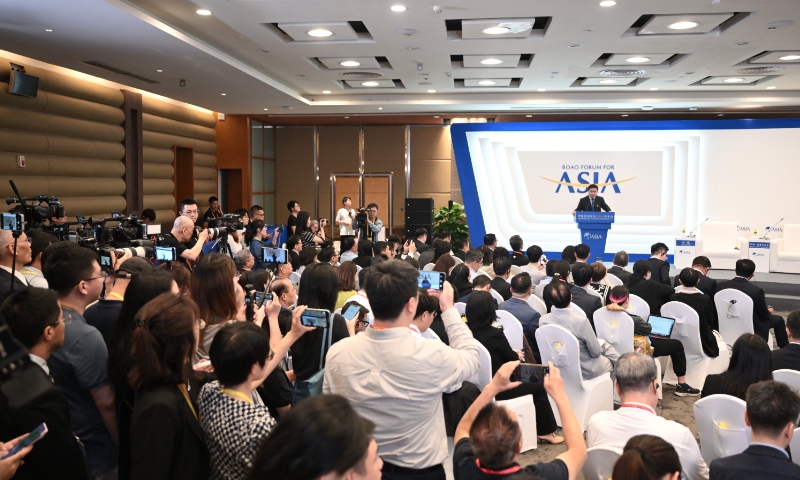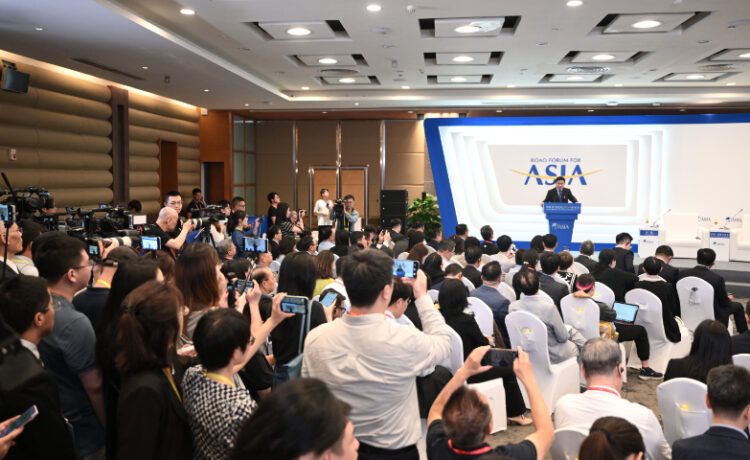
Pan Gongsheng, Pan Gongsheng, the governor of the People’s Bank of China, delivers a keynote speech for a summit at Boao Forum for Asia in Boao, South China’s Hainan Province, on March 27, 2024. Photo: VCG
Central bank officials and financial regulators from several Asian countries on Wednesday called for expanding currency swap arrangements through both bilateral and multilateral mechanisms to support cross-border trade and investment and reduce reliance on the US dollar, as part of the region’s efforts to bolster financial safety nets and fend off risks.
During a panel discussion at the Boao Forum for Asia (BFA)’s annual conference in Boao, South China’s Hainan Province, Asian central bank officials and financial regulators warned of mounting financial risks, citing turbulence within or caused by the US, while highlighting the urgency of boosting financial integration.
Noting Asia’s increasingly critical role in the global economy and the need to maintain sustainable development, Chinese officials and experts on Wednesday called for joint efforts by Asian countries to increase the region’s voice and influence at the IMF, while moving to create an Asian version of the multilateral lender.
Speaking at the panel discussion on Wednesday, Pan Gongsheng, the governor of the People’s Bank of China (PBC), the central bank, also called for joint efforts to increase Asia’s voting rights at the IMF and steadily expand multilateral and bilateral currency cooperation, so as to strengthen Asia’s financial safety net.
Pan said that the IMF must undertake reforms to adjust quotas for members, in order to reflect member countries’ position in the global economy.
“To better reflect the relative status of Asian countries in the global economy, especially to increase the voice and representation of emerging markets and developing countries, Asian countries could urge all parties to reach a consensus on quota calculation as soon as possible,” Pan said.
The Chinese central bank chief also said that Asian countries should steadily improve the efficiency of the Chiang Mai Initiative and expand its functions to strengthen capabilities to guard against external risks.
Established by the 10 ASEAN members and China, Japan and South Korea in 2000, following the Asian financial crisis in the late 1990s, the Chiang Mai Initiative is a multilateral currency swap mechanism aimed at jointly addressing short-term liquidity difficulties in the region and supplementing existing international financial arrangements.
In the latest development, in December 2023, relevant countries agreed to set up a new regional lending facility to respond to emergencies in the region.
According to Pan, the initiative added new terms on local currency funds in addition to US dollar loans in 2021 and there are calls for the establishment of new legal entities under the initiative to strengthen Asia’s financial safety net.
Dong Shaopeng, a senior research fellow at the Chongyang Institute for Financial Studies at Renmin University of China, said that in order to boost financial cooperation and guard against risks, Asian countries should jointly push for an increased voice at the IMF, while also forming an Asian version of the IMF.
“I agree that there should be a monetary fund in Asia. Other regional monetary organizations should also be actively promoted,” Dong told the Global Times on Wednesday.
At the panel discussion at the BFA, other central bank officials and financial regulators noted the need to improve and expand the initiative.
“The Chiang Mai Initiative is very important as a mechanism for local currency swaps. It could help member countries address short-term liquidity issues,” said Bounleua Sinxayvoravong, governor of the Bank of the Lao PDR, noting various efforts to bolster regional cooperation, including local currency swaps and a local currency bond market, to strengthen the regional financial system.
The officials also called for efforts to increase the use of local currencies to reduce reliance on the US dollar to fend off risks.
Destry Damayanti, senior deputy governor of Bank Indonesia, said that with the increase in the number of Asian investors, US and European investors are no longer the dominant force, reflecting Asia’s economic integration. Indonesia is increasing currency swaps with regional countries so as to diversify the foreign exchange market and not rely on a single currency.
Leong Sing Chiong, deputy managing director of the Monetary Authority of Singapore, said that in addition to mechanisms such as the Chiang Mai Initiative and bilateral currency swaps, there is huge potential for Asian countries to carry out cooperation in digital cross-border payments.
According to a report released by the BFA on Tuesday, Asia is fast becoming a key source of growth for cross-border payments, with increased use of real-time payments and digital wallets and a bigger share of cross-border payment for local currency.
















